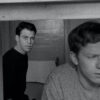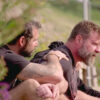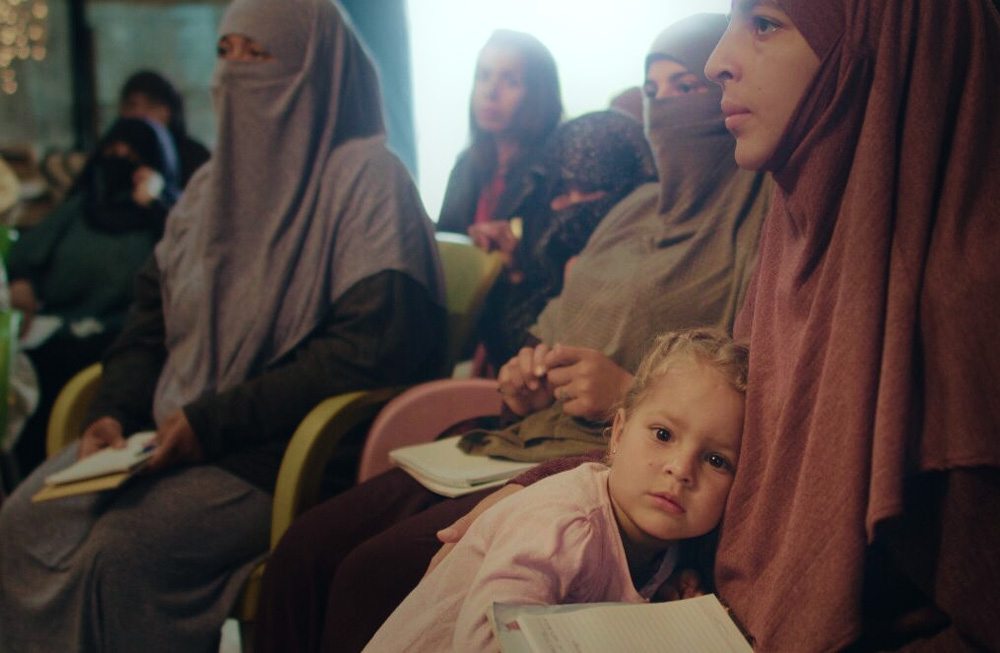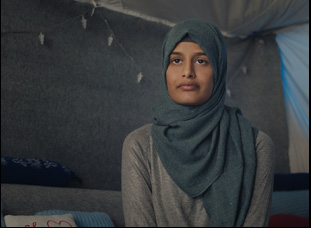It may have been inevitable that after years filming the war against ISIS in Syria, Alba Sotorra Clua shifted her focus to Camp Roj, a detention center on the border of Iraq in Baghouz where survivors of the conflict that suddenly were without a home had come to reside. By making a follow-up to “Commander Arian,” in which she embedded with a battalion of Kurdish female freedom fighters, she could acknowledge both the far-reaching consequences of war and the fact that it never ends for those involved, but making “The Return: Life After ISIS” has a less obvious but no less powerful connection to her previous work when she was drawn to a curious subset of the 1500 women and children who are stationed at the camp, those that were actually on the side of ISIS and have even greater complications when it comes to relocation when they were drawn to Syria from other countries ranging from Canada to the Netherlands.
Sotorra Clua, who previously told the story in “Commander Arian” of a collection of women who had gotten up under the thumb of the patriarchy through fighting in the war, found herself in workshops where she’d listen to accounts of women now trapped by their decision to come to Syria typically at their husbands’ behest, now unwanted in their countries of origin as much as the country they currently find themselves in and vilified by all as they seek extradition. Except, as “The Return” shows, by those who have the most to hold against them when it’s the Kurdish women who run the camp that facilitate group workshops to help ease their feelings of isolation. The film opens up the floor to women such as Shamima Begum, appealing the UK government’s decision to strip her of her citizenship after her decision to move to Turkey led to a marriage with a Dutch fighter for the Islamic State, and Hoda Muthana, the American-born daughter of a Yemen diplomat who was promised in marriage so young that any ideas she had for the life she could lead were futile dreams, who faced relentless shame in the media for joining the ISIS cause without any consideration of how they were led there.
While the detainees struggle without having any sense of resolution in sight, “The Return” also illustrates the burden faced by those running the camp who have to reconcile any lingering bitterness from the havoc wreaked by ISIS with the need to take care of those in front of them and over the course of two years, Sotorra Clua shows the strength of all involved to forge ahead without leaving anyone behind. With the film recently beginning its festival run at SXSW en route to Hot Docs next month, Sotorra Clua spoke about how she felt compelled to stay in Syria to make “The Return,” having the perspective on seeing the aftermath of the war after being there to chronicle it and getting to show the film to its subjects.
I’ve been traveling to Northern Syria since 2015 while I was doing my previous film [where] I was following the life of a woman commander who was fighting against ISIS, so I experienced the war on the Kurdish front lines, and [had] that connection with the Kurdish women, who in the aftermath of the war were the ones in charge of taking care of the other women coming from ISIS. I was really interested in the process of [those] Kurdish women who had experienced the war so heavily and were able to create a frame of space where to connect with the other women from ISIS because in any aftermath of a war that there is a lot of pain and all the wounds are open. The fact that Kurdish women had experienced ISIS violence directly and even so were ready to give a second chance — listening and understanding — it’s necessary because it’s probably the only way out of the cycle of violence, so I wanted to focus on that because I believe this can [teach] us as Europeans and as Americans to self-analyze the way we are approaching this issue and rethink if it’s the right way to do it.
Was it difficult to get access to the camps?
It was very difficult to enter these detention camps — they’re like prisons — but because of my connection with the Kurdish women fighters, who are the ones who control the camps, I gained access because I had built a relationship based on trust for three years and I had very open access to the camps. But in the beginning, it was challenging for everybody — for us and also for the women who participated in the workshop [because] we didn’t directly cast anybody. The workshop was open and the workshop allowed us to film the workshop so any woman who wanted to participate knew they were being filmed.
I think they felt we we were not [like other media in being] hungry for these stories and that we wanted to make public whatever they would tell us very quickly. We were the opposite. We were really careful [to respect] whether they wanted to be filmed or not. There were some women there who didn’t want to be filmed and it was okay, and there were women who first wanted to be filmed, but who didn’t want to be in the film, so we just left them out. They also felt we were there to listen, not to judge them because we were not there to confront.
I also had a lot of preconceptions about the women in the camps. At the beginning, I had no idea that the film will focus so much on them. My idea was to focus on Sevinaz [Evdike], the doctor [leading] the workshop, but as I spent time in the camp and started to hear the stories the women were telling, I felt it was important to give them the space to express themselves in a film that has the length that allows the expressions to be deeper than the ones that they had the chance to do through the media, through the journalists that had visited the camp for only one hour or for two hours, so it was my own process as well as the crew process.
Not only are men absent physically in the film, but you largely don’t hear about them in the women’s stories of how they came to ISIS – how much of a presence did you want the men to have?
Yeah, there is something interesting in the way women approach a conflict resolution and how there is a silence that women have to extreme situations. Focusing on the way women deal in the aftermath of a war was very important for me, but then also the camp is a women’s place — this is a camp that is controlled by women where the [guards] are women and where the people living in the camp were women and children, so it was natural to film who we had in the camp.
Was it interesting having the perspective of actually experiencing the war before entering the detention camps?
This is very important because having done this film without having witnessed the war against ISIS, I would’ve felt that I was navigating dangerous waters, but I feel very secure about what I show in the film I’ve witnessed the atrocities that ISIS committed. I’ve had friends who fought ISIS and lost their lives, and experiencing this also allowed me to look at these women who decided at some point to join ISIS not from a naive point of view. [My perspective] isn’t that I heard that they are terrible because I’ve seen there are some propaganda videos. No, no, I’ve seen what they’ve done and by having colleagues like the Kurdish woman who has seen much more than me and they are ready to give second chances, so it’s about whether we show a pardon or not. It’s about whether it is safe or not to bring these women back [into society] and it’s a very serious matter. We are talking about things that affect people at a very deep level. We are talking about lives that have been lost and I don’t think I would’ve felt legitimate to say yes, they should come back if I had not been there so close to what the group they had joined had done.
It appeared that you spent an intense first year of filming and then went back a year later – was always that the plan?
It came naturally. We did several trips during between 2019 and 2020 in order to follow the progress of the camp, but I wasn’t expecting and they were not expecting to be there for so long. It was important to me to show they are still there.
What is it like getting to the finish line?
It’s always thrilling. The most thrilling is showing it to the protagonists — the women that are inside the film, both the Kurdish and Western women and they had the chance to see the film. I’m happy that they felt they were fairly shown there — they recognized themselves in what I showed them and then all the effort that not only myself and all the team had put in the film, it starts to make sense when you start to see the film going out there and it starts to get reviews and people are interested. It starts to make an impact on what the point of view on the way people see the topic and this issue.
“The Return” will next screen at Hot Docs, streaming online in Canada, on April 29th.





